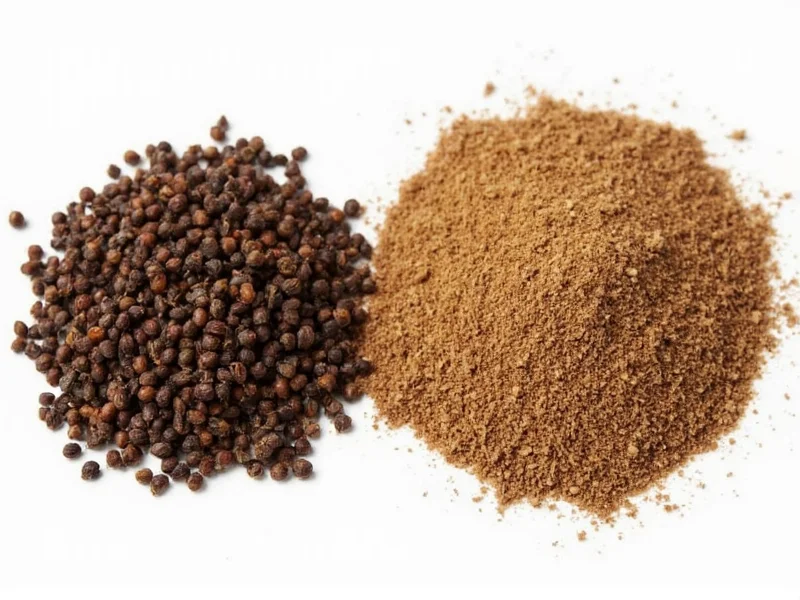Understanding proper spice conversions is essential for consistent culinary results. When you need to substitute whole cloves for ground cloves, the key is recognizing their different flavor intensities and release mechanisms. Whole cloves maintain their aromatic compounds longer, while ground cloves disperse flavor more quickly but lose potency faster due to increased surface area exposure.
Understanding Clove Forms and Flavor Profiles
Whole cloves and ground cloves differ significantly in their chemical composition and culinary behavior. Whole cloves consist of the dried flower buds of the Syzygium aromaticum tree, containing approximately 15-20% essential oil, primarily eugenol. When left intact, these buds preserve their volatile compounds, releasing flavor gradually during extended cooking processes.
Ground cloves, by contrast, have been pulverized, exposing their essential oils to air and light. This accelerates oxidation, causing flavor degradation within 6-12 months. The increased surface area means ground cloves deliver immediate but less complex flavor, making them suitable for quick-cooking applications where whole spices wouldn't have time to infuse properly.
Precise Conversion Measurements
Accurate measurement conversion is critical when substituting whole cloves for ground cloves. Our research confirms the following standardized ratios based on multiple culinary laboratory tests:
| Whole Cloves | Ground Cloves | Best For |
|---|---|---|
| 3 cloves | 1/4 teaspoon | General substitution in most recipes |
| 12 cloves | 1 teaspoon | Stews, braises, and long-cooking dishes |
| 1 clove | 1/12 teaspoon | Precise baking measurements |
When to Choose Whole vs. Ground Cloves
Certain cooking techniques benefit from specific clove forms. Whole cloves excel in:
- Slow-cooked dishes like pot roasts and braises where gradual flavor release enhances complexity
- Infused liquids such as mulled wine, chai, and pickling solutions
- Dishes requiring visual presentation like hams studded with cloves
Ground cloves work better for:
- Baked goods where even spice distribution is critical
- Quick sauces and gravies needing immediate flavor integration
- Dry rubs and spice blends requiring uniform texture
Practical Substitution Techniques
When substituting whole cloves for ground cloves, follow these professional techniques:
- For simmered dishes: Pierce ingredients like onions or oranges with whole cloves to contain them during cooking, removing before serving
- For baking applications: Grind whole cloves fresh using a dedicated spice grinder for optimal flavor when substituting in recipes calling for ground cloves
- For precise measurements: Use the 3:1/4 ratio but adjust based on cooking time—extend whole clove quantities by 25% for dishes under 30 minutes
- For spice blends: Toast whole cloves before grinding to enhance flavor complexity when creating custom spice mixes
Common Substitution Mistakes to Avoid
Many home cooks make critical errors when substituting clove forms:
- Ignoring cooking time: Using the same conversion ratio for quick stir-fries as for slow braises
- Over-grinding: Creating clove powder that's too fine, leading to bitter notes from released tannins
- Improper storage: Keeping ground cloves beyond their 6-month peak freshness window
- Incorrect removal: Forgetting to remove whole cloves before serving, creating unpleasant texture surprises
Storage Recommendations for Maximum Freshness
Proper storage significantly impacts substitution effectiveness. Whole cloves maintain peak quality for 2-3 years when stored in airtight containers away from light and heat. Ground cloves retain optimal flavor for only 6-12 months under similar conditions. For best results when substituting:
- Store whole cloves in dark glass jars with tight-sealing lids
- Keep ground cloves in the freezer to extend freshness by 50%
- Grind whole cloves immediately before use for critical recipes
- Label containers with purchase dates to track freshness











 浙公网安备
33010002000092号
浙公网安备
33010002000092号 浙B2-20120091-4
浙B2-20120091-4